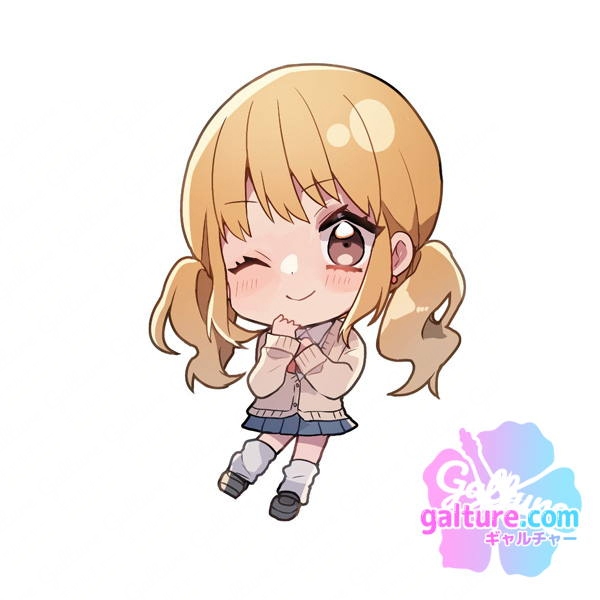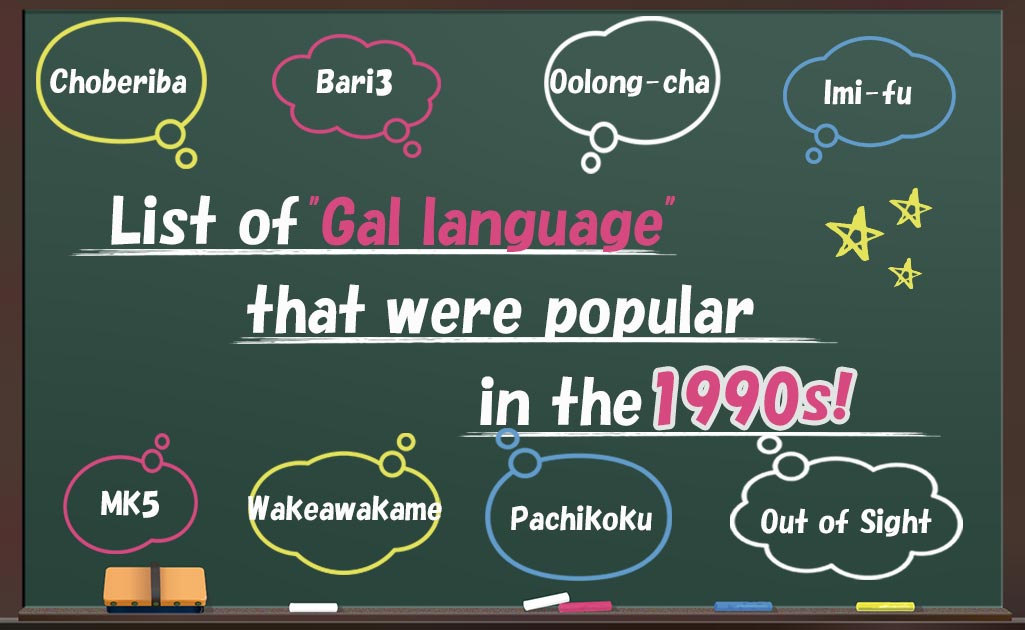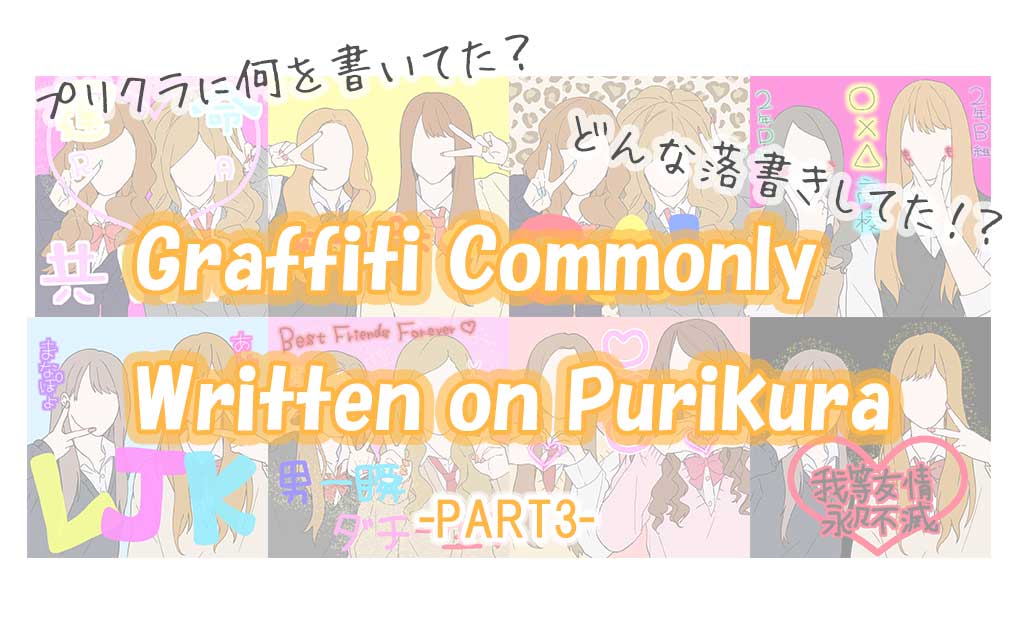Being both “super very bad” (超ベリーバッド) and “super very blue” (超ベリーブルー) was called チョバチョブ (Chobachobu)!
“Gal slang” that was popular in the 1990s! Here we introduce the meanings and the usage all at once!
Gal language is commonly called youth slang. It continues to evolve year by year, with new words appearing one after another.
More recent gal slang includes “きゅんです (kyun desu)” which is used to express the feeling of your heart fluttering, and “やりらふぃー (yarirafii)” which is used when someone is hyped up. Both were ranked in the Gal Popular Phrase Awards of 2020.
Additionally, in 2021, “kyapai” meaning “overwhelmed” and “zussho,” an abbreviation of “always together,” also ranked in the Gal Popular Phrase Awards.
So, what kind of gal slang was popular in the past?
I'd like to pick up some of the past popular gal language and introduce them one by one!
チョベリバ・チョべリグ - Choberiba/Choberigu
Two words that were popular among kogals in the late 1990s.
It became widely recognized by the public after Takuya Kimura used it in one scene of a drama.
However, because Gal slang changed quickly it soon fell out of use.
| チョベリバ (Choberiba) | Meaning | An abbreviation of 超ベリーバッド (super very bad), which means “the worst.” |
|---|---|---|
| Usage | Used with the same nuance as “the worst” and “bad”. | |
| Example sentence | 「最近太ったんだけど~。チョベリバ~」“I gained weight recently, Choberiba…” |
| チョべリグ (Choberigu) | Meaning | An abbreviation of 超ベリーグッド (super very good), which means “the best.” |
|---|---|---|
| Usage | Used with the same nuance as “the best” and “great.” | |
| Example sentence | 「イケメンにナンパされた~。チョベリグじゃね?」 “I got hit on by a handsome guy. Isn’t that choberigu?” |

ナウい - Nowy
The term “Nowy” was said to be popular around 1979.
Now it’s treated as an obsolete word and rarely heard.
If translated into modern terms, it would be equivalent to words like “Trendy!”, “Cool!”, and “Stylish!”.
| ナウい (Nowy) | Meaning | A word formed by turning the English word “now” into an adjective. In essence, “nowy” represents “current-ness” or “trendiness.” |
|---|---|---|
| Usage | Used for someone who is sensitive to trends or incorporates trends into their actions and fashion. It can also be used as a compliment, similar to saying “you’re stylish” or “that’s lovely”. |
|
| Example sentence | 「その服装かわいい!ナウいね!」 “That outfit is cute! So nowy!” 「ナウい格好の男性にナンパされた」 “I got hit on by a guy who looked very nowy.” |
オバタリアン - Obattalion
The term “Obattalion” is in reference to a horror film called “The Return of the Living Dead” which came out under the title バタリアン (Battalion) in Japan.
It was selected for the Gold Award in the 1989 New Words and Buzzwords Awards () and was frequently heard during the 90s.
However, many teenagers and people in their 20s today might not be familiar with it.
| オバタリアン(Obatarian) | Meaning | A word born from combining “Oba-san” (a meddling older woman) and “Battalion”, which is used to mean “horde”. It refers to a “self-centered older woman,” or a “meddling older woman.” The 4-panel comic strip named “Obatarian” (オバタリアン), which depicted such middle-aged women, started its serialization in 1987, leading to the widespread use of this term. |
|---|---|---|
| Usage | Used to describe pushy middle-aged women, such as a gossip-loving or overly helpful woman. | |
| Example sentence | 「オバタリアンが何食わぬ顔で、レジの列に割り込んできた」 “An obattalion casually cut into the checkout line.” 「バイト先のオバタリアンが人の恋バナに突っ込んでくる」 “The obattalion at my part-time job always pries into people’s love stories.” |
. New Words and Buzzwords Awards refer to a prize given to particularly commonly used words that were either coined or became popular in that year. It's also sometimes referred to as the “U-CAN New Words and Buzzwords Awards.”
アウト・オブ・眼中 - Out-of-Sight
This word was popular in the late 1990s and is now considered an obsolete word.
| アウト・オブ・眼中(Out of sight) | Meaning | It has meanings like “not under consideration,”“out of the question,” or “beyond discussion.” |
|---|---|---|
| Usage | It was often used to convey disinterest towards someone of the opposite sex. However, since it carries a negative connotation, caution is required when using it. |
|
| Example sentence | 「学校で一番かっこいいって言われているようだけど、私はアウト・オブ・眼中だな」 “He might be considered the coolest guy in school, but to me, he’s out-of-sight.” 「強い男が好きだから、弱々しい男はアウト・オブ・眼中」 “I like strong men, so weak-looking men are out-of-sight for me.” |
意味不 - Imifu
The word “imifu” is also not used much nowadays.
| 意味不(Imi-fu) | Meaning | An abbreviation for 意味不明 (imifumei) which means “incomprehensible” or “meaningless”. |
|---|---|---|
| Usage | Used when something doesn't make sense or is hard to understand. |
|
| Example sentence | 「今回の歴史のテスト、意味不だったわ~」 “The history test this time around was imifu~” 「父親から意味不なメールが送られてきた」 “My father sent me an imifu email.” |
ウーロン茶 - Oolong Tea
This was youth slang from the 1990s, but it seems to be getting attention again recently.
| ウーロン茶(Oolong-cha) | Meaning | It’s an abbreviation of the Japanese words for “ウザイ (ウー) (annoying), ロン毛の (ロン) (long-haired), 茶髪男子 (茶) (brown-haired guy)”. |
|---|---|---|
| Usage |
A term mainly used by women when expressing distaste for men with long, brown hair. Or when they find a man’s behavior annoying. It may seem like the target audience is small, but there was a time in the 1990s when many men wore this hairstyle.Therefore, the word was frequently used. |
|
| Example sentence | 「あの集団ウーロン茶ばっかりじゃん、近寄りたくない~」 “That group is just full of Oolong-cha guys. I don’t want to go near them~” 「ウーロン茶は受け付けません」 “I don’t like Oolong-cha guys.” |
MK5
While "MK5" was an abbreviation for Ryōko Hirosue's single "Maji de Koi suru 5-byō Mae" released in 1997, the "MK5" we're discussing here has a slightly different meaning.
| MK5 | Meaning | It is an abbreviation for the Japanese words "Majide", "Kireru", and "5 seconds ago". |
|---|---|---|
| Usage | Used when one has witnessed an unpleasant behavior or situation. It's often used in a somewhat lighthearted way. |
|
| Example sentence | 「学校で一番かっこいいって言われているようだけど、私はアウト・オブ・眼中だな」 “He might be considered the coolest guy in school, but to me, he’s out-of-sight.” 「強い男が好きだから、弱々しい男はアウト・オブ・眼中」 “I like strong men, so weak-looking men are out-of-sight for me.” |
Paisen
This might still be a popular term among the youth.
Originally, it was popularized by the comedian "Katsuya Yano" of the duo "Yano and Hyodo".
Currently, due to the influence of YouTuber "Usatani Paisen" with over 400,000 subscribers, it's a term often used by high school girls.
| Paisen | Meaning | The Japanese word for "senpai" is read backwards. Refers to someone superior or in a high position. |
|---|---|---|
| Usage | Often used in contexts referring to senior-junior relationships, though it's not easy to use unless you're quite familiar with the person. | |
| Example sentence | Paisen looked even cooler today than usual. I learned a lot from Paisen. |
Pachikoku
"Pachikoku" was a term primarily used by middle and high school girls.
The word originally comes from the Kansai dialect word "Pachimon", which means "fake".
| Pachikoku | Meaning | "Pachi" refers to "fake, lie," and "Koku" means "to inform, to say". Thus, it means "to lie" or "to tell a lie." |
|---|---|---|
| Usage | Commonly used in conversation directed towards someone else, replacing phrases like "Don't lie" or "Did you lie?" |
|
| Example sentence | A: I went on a date with the most popular senior in school. B: Really? Pachikokuna!(Don't lie!) C: Oh, the sale ended already. D: Wow, Pachikoita(you lied). |
Bari3
Written as "Bari3" and pronounced as "Barisan".
This term spread from the late 1990s, and anyone who used a flip phone before the rise of smartphones might know it.
| Bari3 | Meaning | Abbreviation for "three antennas are standing up" in Japanese. An antenna is an antenna mark that indicates the radio reception status of a mobile phone. "3" refers to the number of antennas. In other words, it is a word that indicates that the radio wave reception is extremely good. |
|---|---|---|
| Usage | Used to describe a situation when the antenna (signal strength) is at its maximum of three bars. | |
| Example sentence | Let's call a taxi while we have bari3. The signal got bad all of a sudden; it was bari3 just a moment ago. |
Wakeawakame
The term "Wakewakame", which has become obsolete, is recognized by many as it was used in the skits by the bubble comedian "Nora Hirano".
| Wakeawakame | Meaning | A play on words combining "don't understand" with the seaweed "wakame". "Wakame" itself doesn't have a specific meaning in this context. |
|---|---|---|
| Usage | Mainly used when referring to incomprehensible statements or actions. | |
| Example sentence | They explained it, but it was so wakewakame(I didn't get it). That person sometimes does wakewakame(things that make no sense). |
Kishoi
"Kishoi" is a word commonly used in daily conversation.
It originally came from the Kansai region but spread nationally around the 1990s.
| Kishoi | Meaning | It is an abbreviation of the Japanese word "kimochiwarui, " which means "feeling sick" or "feeling disgust." |
|---|---|---|
| Usage | Used when something looks unpleasant. Variations like "Kissho" and "Kisshoi" are also common. |
|
| Example sentence | I can't touch insects; they're kishoi. Today's outfit is kishoi. |
Ino-head
"Ino-head" started to be used among "Kogyaru" (a subculture of girls) in the early 2000s.
Like "Yamahando" for the Yamanote line and "Keikingu" for the Keio line, it refers to a specific train line.
| Ino-head | Meaning | It refers to the "Keio Inokashira Line" connecting Shibuya station and Kichijoji station. It is a word that combines "ino" from "Inokashira" and "head", which is the English translation of "head". |
|---|---|---|
| Usage | In everyday conversation, it is used in place of the phrase "Keio Inokashira Line." | |
| Example sentence | It's faster if you take the Ino-head!( Inokashira Line!) If you're going there, the Ino-head (Inokashira Line) is convenient. |
Uso-pyon
"Uso-pyon" was commonly used around 1996.
Although it was treated as an obsolete word in the 2000s, it won first place in the "Dead Words We Still Use" ranking by goo in 2009.
Its playful sound might be why some people still use it.
| Uso-pyon | Meaning | Derived from "Uso dayo-n!", which was then abbreviated to "Uso da-pyon" and further simplified to "Uso-pyon". |
|---|---|---|
| Usage | Often used after telling a joke to reveal, "Just kidding!". It's a handy phrase to lighten the mood. However, be careful when using it after telling a serious lie as it may come off as inappropriate. |
|
| Example sentence | A: Actually, that handsome actor is my relative. B: Really!? A: Uso-pyon! |
MM
It's pronounced MM(Em-Em) in Gal language.
| MM | Meaning | Derived from the initials of "Maji" (really) and "Mukatsuku" (annoying), it represents extreme annoyance or anger. |
|---|---|---|
| Usage | Often used to express strong annoyance or anger. Prefixing with "Chou" intensifies the emotion. |
|
| Example sentence | I get MM when told to study. I found out my boyfriend cheated on me, Chou MM! |
Ganbu
"Ganbu", sometimes pronounced "Ganbu-", is a word that requires caution when using.
| Ganbu | Meaning | An abbreviation of "Ganmen Busaiku" or "Ganmen Busu", meaning "Ugly Face". |
|---|---|---|
| Usage | Used derogatorily about someone's appearance. It seems to be used more often by women than men. Variants like "Chouganbu"are also in use. |
|
| Example sentence | You're Ganbu, yet you're so cocky. |
White Kick
This term was popular around 2004, but apparently existed from the late Showa 50s.
Nowadays, it's almost obsolete.
| White Kick | Meaning | The word is derived from the Japanese words "Shira (白) = white" and "Keru (蹴る) = kick". It is a Japanese verb that expresses a state in which the original atmosphere or tension is lowered due to some event or someone's words and deeds. In English, it is similar to "to procrastinate" and "to lose interest." |
|---|---|---|
| Usage | Used when a joke falls flat or when someone's words or actions make the atmosphere awkward. | |
| Example sentence | It'd be a White Kick to run into my parents during a date. That comment in this situation was a White Kick. |
Ukeru
"Ukeru" is widely used, not only by young people but also across various age groups.
| Ukeru | Meaning | Originally, "Ukeru" meant to receive high acclaim, as in a performance receiving applause or cheers from an audience. From there, it evolved to mean "funny" or "hilarious". In the Kanto region, many people take this word as a compliment, but in the Kansai region (mainly Osaka), it seems that many people feel that they are being made fun of. Therefore, it may be best to avoid using it in some areas. |
|---|---|---|
| Usage | Used when someone finds something personally funny or amusing. Variants like "Chou Ukeru", "Maji Ukeru", and "Uke Sugiru" are used to express greater amusement. |
|
| Example sentence | Check out this picture, it's Ukeru! The way my hair's sticking up is Maji Ukeru. |
How was it?
Have you ever heard of Gal language?
New words are created every year in the Gal language, and the language changes rapidly.
There are gal language that were popular at the time but are no longer used, and gal language that are still popular today.
I'm looking forward to seeing what kind of gal language will appear next.


